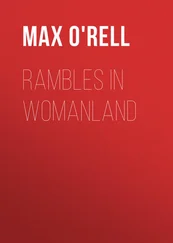Max O'Rell - Woman and Artist
Здесь есть возможность читать онлайн «Max O'Rell - Woman and Artist» — ознакомительный отрывок электронной книги совершенно бесплатно, а после прочтения отрывка купить полную версию. В некоторых случаях можно слушать аудио, скачать через торрент в формате fb2 и присутствует краткое содержание. Издательство: Иностранный паблик, Жанр: foreign_prose, на английском языке. Описание произведения, (предисловие) а так же отзывы посетителей доступны на портале библиотеки ЛибКат.
- Название:Woman and Artist
- Автор:
- Издательство:Иностранный паблик
- Жанр:
- Год:неизвестен
- ISBN:нет данных
- Рейтинг книги:3 / 5. Голосов: 1
-
Избранное:Добавить в избранное
- Отзывы:
-
Ваша оценка:
- 60
- 1
- 2
- 3
- 4
- 5
Woman and Artist: краткое содержание, описание и аннотация
Предлагаем к чтению аннотацию, описание, краткое содержание или предисловие (зависит от того, что написал сам автор книги «Woman and Artist»). Если вы не нашли необходимую информацию о книге — напишите в комментариях, мы постараемся отыскать её.
Woman and Artist — читать онлайн ознакомительный отрывок
Ниже представлен текст книги, разбитый по страницам. Система сохранения места последней прочитанной страницы, позволяет с удобством читать онлайн бесплатно книгу «Woman and Artist», без необходимости каждый раз заново искать на чём Вы остановились. Поставьте закладку, и сможете в любой момент перейти на страницу, на которой закончили чтение.
Интервал:
Закладка:
"What an idea! There is not a woman in the world with whom I should like to change places. How could I be happier than I am?"
"What is your definition of happiness?" said Philip, continuing to paint.
"For a woman," replied Dora, with warmth, "happiness consists in being loved by the man whom she loves and can be proud of; in being rich enough to afford all the necessary comforts of life, and poor enough to make pulling together a necessity; an existence hand in hand, side by side. And what is yours?"
"Well, I confess, I should like to be a little richer than that," said Philip, with a little amused smile.
"Ah! I see," exclaimed Dora sadly; "you are beginning to grow tired of this quiet life of ours. Take care, Philip, noise frightens happiness away. Happy the house that is hidden in the trees, as the nest in the thick of the hedges."
"My dear child, we have to live for the world a little."
"Excuse me if I do not understand you," said Dora; "I am only a woman. I can live for you, and for you alone. I know that love is not sufficient even for the most devoted and affectionate of husbands. A woman can live on love and die of it. That's the difference. Now, what is your definition of happiness?"
"To be blessed with a dear, adorable wife; to have money enough to enable me to surround her with every luxury. Yes, I long to be really rich, if only to make my father repent of his treatment of me. In his eyes a man is successful according to his proven ability to pile up money. Ah, that letter of his, how it rankles in my mind still and always will!"
"What letter is that?" said Dora; "you never spoke to me of it before. Why, what a tomb of dark secrets you are!"
Philip rose, went to a drawer, took out a letter, and returned with it in his hand.
"Here it is," he said; "listen."
"MY SON,
– When I opened to you the doors of the banking house which I have founded, and bade you join me as a clerk who would eventually be master of it, I did not doubt that you had sufficient good sense and filial docility to make you joyfully accept such an opening. It appears that you have neither of these qualities. Twice I have made the offer, twice you have declined it. From this day please to consider yourself free to follow art or any other road to starvation. I relinquish all right to direct your career, but I also require you to relinquish all right to call yourself the son of
"THOMAS GRANTHAM."Philip folded the letter and replaced it in the drawer.
"Yes," said Dora, "it was a cruel letter, for, after all, your only crime had been to wish to become an artist. And yet, a father knows that out of a hundred men who take up painting as a profession, one or two perhaps get to the top of the tree. Where is the father who would advise his son to work at art, music, or literature for a livelihood? In the case of a real vocation, he may bow gracefully to the inevitable, but, as a rule, a parent does not bring up his sons with a view to making artists of them. On the contrary, he does what he can to dissuade them from choosing that course. In the case of your father, my dear Philip, I think one might allow extenuating circumstances. Where is the head of the family who would not dread for his sons these often illiberal professions? Professions, which ninety-nine times out of a hundred bring in little besides disappointments, disillusions, a miserable pittance, and often despair? Try and forget this grievance, darling. In any case you have had your revenge already. You are celebrated, and we are no longer poor."
"Ah, but we have been, and it has sometimes brought tears of rage to my eyes, and to-day we are a long, a very long way, from being rich."
"Ah, but think what an enviable lot yours is!" said Dora proudly. "Yours is the most honourable of callings. You have no poor wretches sweating for you. Your income is the fruit of your personal handiwork. You are your own master. You help to make life beautiful. You have a fame increasing every day. You enjoy the respect of everybody, the admiration of the public, the appreciation of the best critics, the company and the friendship of all the intelligence of London. A king might well envy the life of a great artist!"
Dora was excited, and Philip looked at her with eyes that thanked her for all she thought of him.
"You are quite right," he resumed, "and I am far from complaining of my fate. I have also full confidence in the future. But you, my darling; it is of you I am thinking."
"Of me?" exclaimed Dora. "But do I not share all your honours? What more can I wish for? Why, my dear boy," she added, laughing, "before ten years have passed you will be knighted, and I run the risk of being one day Lady Grantham. Just fancy?" And she drew herself up most comically.
They both burst out laughing. Philip was in a confessing mood, and he went on.
"I should like," he said, "to see you the mistress of such a house as you were brought up in!"
"Good heavens! It is all I can do to keep this dear little one properly! Besides, where is it now, that beautiful house where I was brought up? After my mother's death, my father took to speculating, and he died penniless. Everything had to be sold to pay his debts. Much better begin as we do than finish as he did."
"I should like," continued Philip, in the same strain, "to see you drive in a handsome carriage of your own."
"A hansom cab," replied Dora, laughing, "is much more convenient, goes faster, costs less, and gives you much less trouble."
"I should like to see rivières of diamonds on your lovely neck, precious stones on your fingers."
Dora looked serious, almost sad.
"I wish no better collar for my neck than your true, manly arms – my Philip! On my fingers? Do you see this little ring?"
"A five-pound ring!" said Philip, with an air of contempt. "I am almost ashamed to see it on your finger."
"A five-pound ring!" exclaimed Dora, – "a priceless ring! Do you remember – ah, I do! – how for many weeks you put away ten shillings a week so as to be able to buy it for me on my birthday? A five-pound ring, indeed! Not for the Koh-i-nûr would I exchange it," she added, as she kissed the little ring passionately. "To me the real value of a jewel is the love it represents in the giver, and no rich gems could be richer in that sense than this dear little ring."
Philip felt deeply moved and almost humiliated. He tenderly kissed Dora, and resumed painting. Dora thought she was gaining her cause, and went on pleading —
"Ah, Philip," she said, "the rich don't know the pleasures they miss, the sweetest pleasures of poverty. Their gifts cost them no sacrifice. They don't possess their wealth, it is their wealth that possesses them. They have not the satisfaction of knowing that they are loved for their own sake. I would not give one year of my life for ten years of a millionaire's life. Why, they don't even have the proof that they are honest. They have no temptations. I would shudder at the idea that I might be rich one day."
"Well," said Philip sarcastically, "I think I could bear it with fortitude. My darling, the philosophers of all ages have taught that money does not make happiness; but sensible men of all times have come to the conclusion that it considerably helps to make it. I want money for no sordid reason. Money is round, it was meant to roll, and I mean to enjoy it."
"No, dear," replied Dora reproachfully and pathetically, "money is flat, it was meant to stop and be piled up a little. And, by the way, do you know that you have made over a thousand pounds this year, and that we have kept very nearly half of it? You see I am of some use after all. The financial position is good, since the Chancellor of the Exchequer has only spent half his budget. We are rich, since we don't want all we have."
Читать дальшеИнтервал:
Закладка:
Похожие книги на «Woman and Artist»
Представляем Вашему вниманию похожие книги на «Woman and Artist» списком для выбора. Мы отобрали схожую по названию и смыслу литературу в надежде предоставить читателям больше вариантов отыскать новые, интересные, ещё непрочитанные произведения.
Обсуждение, отзывы о книге «Woman and Artist» и просто собственные мнения читателей. Оставьте ваши комментарии, напишите, что Вы думаете о произведении, его смысле или главных героях. Укажите что конкретно понравилось, а что нет, и почему Вы так считаете.












